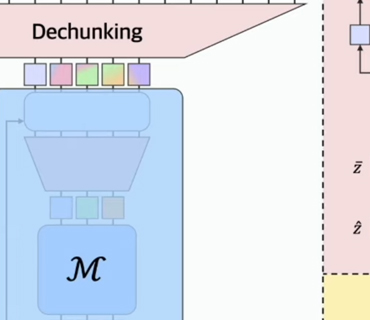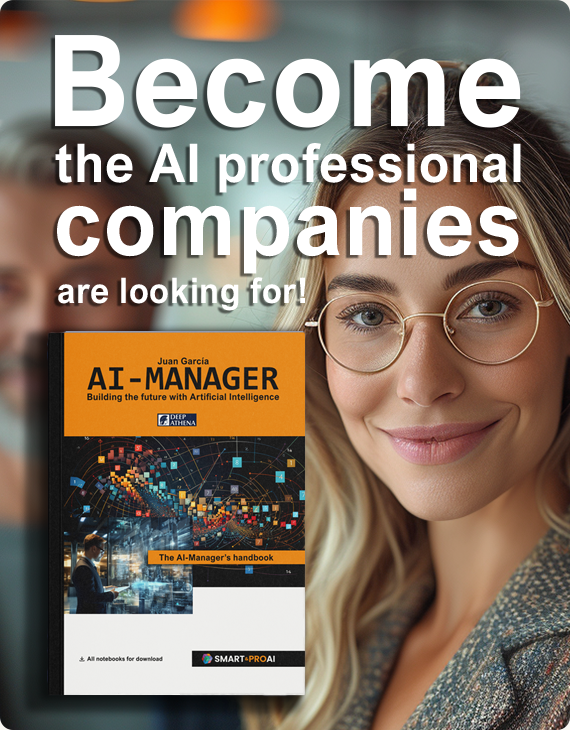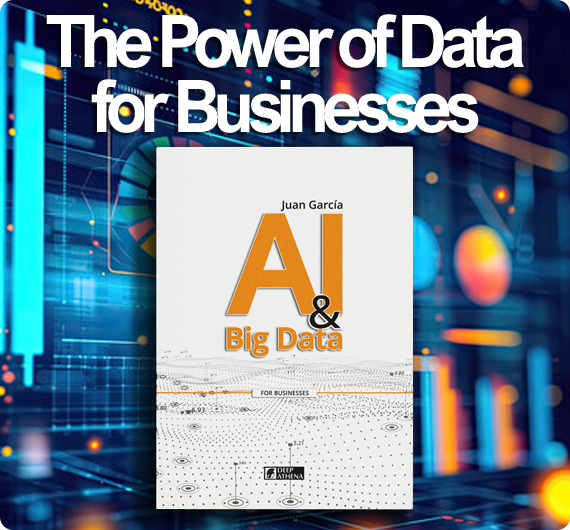Articles

Discover the Key Role of the AI Manager
Artificial Intelligence is changing the job market. Companies are facing the urgent need to adapt to a competitive market undergoing an evolution like never before.
Do you think it has been seen before? Why? Are you referring to the industrial revolution? Allow me to tell you that this has nothing to do with anything seen before! The technological revolution we are experiencing now is unprecedented in human history, and for a long time, we won't see such a drastic change again, neither in the corporate world nor in the private sphere. The speed at which AI is evolving, the speed at which companies must learn and adapt, the speed at which humans have to absorb and accept AI, are changes, all happening at the same time, that have never been experienced in our society before.
Companies urgently need to adapt to this change, a change for which there is no prepared job market. There is a shortage of qualified professionals who can advise companies and lead these new projects in the best direction to achieve the best possible results in the short term.
Companies need an expert in artificial intelligence who is also an expert in AI project management and, very importantly, understands the structure and functioning of a company well.
This is where a new role within companies is born, the AI Manager. An expert in Artificial Intelligence, an expert in AI project management, and someone with extensive knowledge and years of experience in the corporate world.
Unfortunately, due to a lack of awareness about this role, companies are hiring the wrong people for the job. In the absence of understanding about this role, they are seeking individuals who can demonstrate previous experience in AI-related positions, regardless of whether they are truly AI experts, experts in AI project management, or have a deep understanding of a company's structure and needs.
We are already accustomed to poor hiring processes and unprofessional recruiters. But what is happening now will affect millions of companies, as those that cannot adapt will simply disappear. Companies that fail to develop their AI projects and implement AI positively and satisfactorily will not survive the change and will eventually go out of business. The loss of value, investments in black holes, the inability to adapt, poor management of a recruitment department, the lack of project manager experience, overconfidence, and, above all, a lack of understanding of the current situation will lead millions of companies worldwide to bankruptcy. Only moderately strong companies will survive because, with this change, EVERYTHING is going to change. The way we interact with technology, our lives, our needs, the way we produce, the way we work, the job market, competition, and how competition is done. Everything is going to change, and the best/worst part of it all is that it changes to stay in constant change.
AI is not just going to change how we interact with our mobile phones or how video streaming platforms offer recommendations. AI is going to mark a historic before and after in our lives. It will completely change medicine, technology, science, education, and even how we spend our free time.
Due to the importance of this change, it is vital for many companies to understand that now more than ever they must change the way they approach their hiring processes. The old hiring model they have been using from A to Z for the past 30 years is no longer valid.
Now, it is more important than ever to open up and recruit truly qualified personnel for the job. Criteria such as seniority, mindset, a minimum of 5 years of experience in a similar position, a Master's degree in mathematics or physics, and so on, are no longer valid. Many people may be prepared to take on the responsibility, but there are three very important factors that must align in the candidate for the position: expertise in AI, expertise in AI project management, and knowledge and experience in a company.
On the other hand, when a person obtains a certification, they gain some minimum knowledge and experience in the field. However, that doesn't necessarily mean the person is prepared. Other factors, such as demonstrable extra experience through projects on platforms like Kaggle or GitHub, where recruiters can evaluate the extra work done, come into play. The problem in most cases is that recruiters do not understand the fields and, therefore, cannot truly appreciate these projects that provide candidates with valuable experience and knowledge, which unfortunately will not be adequately reflected on their resumes.
An effective AI Manager needs a specific set of skills and competencies, including:
- Developing AI strategies and roadmaps: This involves designing customized AI strategies that align with the specific needs and goals of the company, identifying AI use cases, prioritizing initiatives, and establishing milestones and success criteria.
- Selection and implementation of technologies: Supporting the selection of suitable AI technologies and platforms, which involves evaluating AI frameworks, cloud platforms, hardware options, and integrating AI solutions into existing business processes and systems.
- Data management and analysis: Effective data management is crucial for AI success. This includes assisting in data collection, organization, and analysis to derive valuable insights that can be used to develop and implement AI solutions.
- AI training and development: Through customized training and development programs, enhancing the team's understanding and skills in the field of AI. This includes technical training for developers and data scientists, as well as training to promote understanding and acceptance of AI within the organization.
- AI governance and risk management: Assisting in the development and implementation of AI governance and risk management strategies. This involves identifying potential risks associated with AI, such as data privacy, security, and ethical considerations, and developing policies and processes to manage these risks.
- Technical and project leadership: This includes leading and managing the development and implementation of artificial intelligence within a company, overseeing the progress of AI projects, ensuring milestones are met, and adjusting the course as needed.
- Budget management and communication: Managing financial resources for AI projects, including budget planning and allocation. Effective communication is also essential to bridge the gap between technical and non-technical teams, stakeholders, and management.
- AI culture and continuous learning: Promoting a culture of AI throughout the organization and fostering data-driven decision-making. Additionally, staying updated with AI technologies and trends to ensure the company remains competitive.
- Keeping up with the latest trends and technologies: The AI Manager must stay informed about the latest trends and developments in the field of AI. This includes new machine learning techniques, advances in natural language processing, developments in robotics, and more.
- Continuous education: Education doesn't end with a degree or certification. AI Managers must actively seek learning opportunities, such as courses, workshops, conferences, and webinars, to improve their skills and knowledge.
- Professional networking and community involvement: Participating in professional communities and networks is crucial for sharing ideas, learning best practices, and maintaining a fresh and updated perspective on how AI is being applied in different sectors.
- Experimentation and personal projects: Practical experimentation with personal projects or pilots within the company is an excellent way to gain a deep understanding of new AI technologies and applications.
- Interdepartmental collaboration: Collaborating with other departments within the company can provide a broader view of how AI can be applied in different areas and business processes.
- Publications and research: Staying informed through leading AI publications and engaging in research provides a deep understanding of both theoretical advances and practical applications.
"AI-Manager: The AI Manager's Handbook" is an essential work for any professional interested in managing Artificial Intelligence projects. This book is particularly valuable for companies looking to integrate AI into their operations, recruiters seeking to identify suitable talent in this field, and those looking to better understand the world of AI. It offers a comprehensive guide, addressing everything from strategy and planning to the implementation and management of AI projects. Its practical and detailed approach makes it an indispensable resource for any AI Professional or anyone interested in this field.
Learn everything about Artificial Intelligence and its history, Machine Learning and its methods, the implementation of AI and ML in companies. Learn how to manage an Artificial Intelligence project and the most suitable methods and techniques related to Project Management. Learn all about Data and how to manage it for each AI project. Discover the best platforms and programs for working on the development of Machine Learning models. Explore use cases and applications of AI for ALL departments of a company. Learn about Bias, AI ethics, and rights. Get to know the Internet of Things and Tiny Machine Learning (TinyML).
Become an AI Manager!














The Author
Juan García
Juan García is an Artificial Intelligence Expert, Author, and Educator with over 25 years of professional experience in Industrual Businesses. He advises companies across Europe on AI Strategy and Project Implementation and is the Founder of DEEP ATHENA and SMART &PRO AI. Certified by IBM as an Advanced Machine Learning Specialist, AI Manager and Professional Trainer, Juan has written several acclaimed Books on AI, Machine Learning, Big Data, and Data Strategy. His Work focuses on making complex AI Topics accessible and practical for Professionals, Leaders, and Students alike.
More